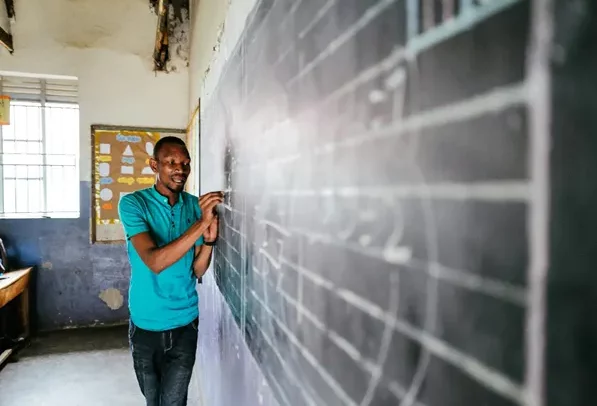A teacher in the classroom
Over 90% of students can’t identify letter names, letter sounds or read simple words at expected levels after three years of schooling a new literacy report has revealed.
According to the report, ‘Effective Reading Instruction in Low- and Middle Income Countries: What the Evidence Shows,’ failure to use evidence-based approaches to instruction is one of the main causes of the literacy crisis.
“Too many children are in school but not yet learning to read. This report underscores how literacy is at the very core of a child’s learning trajectory – shaping their opportunities and future,” said Pia Rebello Britto, UNICEF Global Director, Education and Adolescent Development.
A study launched at the ADEA Triennale in Ghana analysed data from early grade reading assessments (EGRAs) from over 500,000 students across 48 LMICs in 96 language.
This new paper is based on evidence from around 120 studies (including 50 studies in African countries), on effective reading instruction conducted across Africa, Asia, Latin America, and the Middle East, across over 170 languages of which 22 languages are specific to the African region (including; Arabic, Chichewa, isiZulu, Kikamba, Kiswahili, Oromo, Setswana and Siswati and amongst others).
The report is endorsed by the Global Education Evidence Advisory Panel (GEEAP), an independent, multidisciplinary panel of leading global experts in education evidence and policymaking that is co-hosted by the UK’s Foreign, Commonwealth & Development Office (FCDO), UNICEF and the World Bank.
It highlighted two main sets of skills needed for reading – decoding and language comprehension.
“Decoding is the ability to recognise written symbols (e.g., letters) and convert them into the sounds they represent to recognise words. Language comprehension involves understanding the meaning of words, sentences and text,” it stated.
“A central finding of science-based approaches to reading is that children do not learn to read naturally: they must be explicitly taught. Going from consensus to identifying specific skills for all languages including African languages is an important concrete contribution to improving literacy practices,” said Nompumelelo Mohohlwane, co-author of the literacy report and Deputy Director at the Research Coordination, Monitoring and Evaluation Directorate at the Department of Basic Education, South Africa.
“Literacy is the cornerstone to education, lifelong skills, and meaningful employment. When children master literacy early, they have better learning outcomes, and are more able to adapt, innovate, and thrive in the rapidly evolving job markets of the 21st century,” Luis Benveniste, World Bank Global Director for Education and Skills added.
The report urges education policymakers to promote evidence-based instruction so more children become skilled readers, recommending that policymakers make a national commitment to ensure all children become skilled readers through effective, evidence-based instruction.
“Choose appropriate languages of instruction and give children the support they need to learn to read in those languages,” the report indicated.
Nathanael Bevan, Deputy Director Research, FCDO, said, “These approaches offer policymakers a practical evidence informed plan for improving reading in schools. They can be aligned to local contexts, cultures, languages, and goals, using the accompanying how to guide to help tailor implementation.”
A Daily Guide Report


